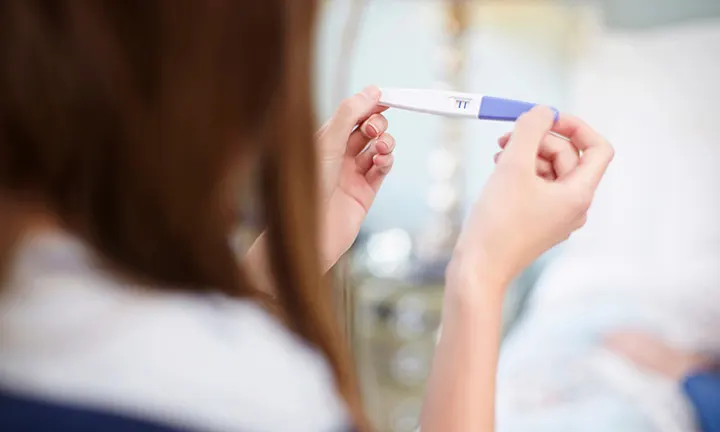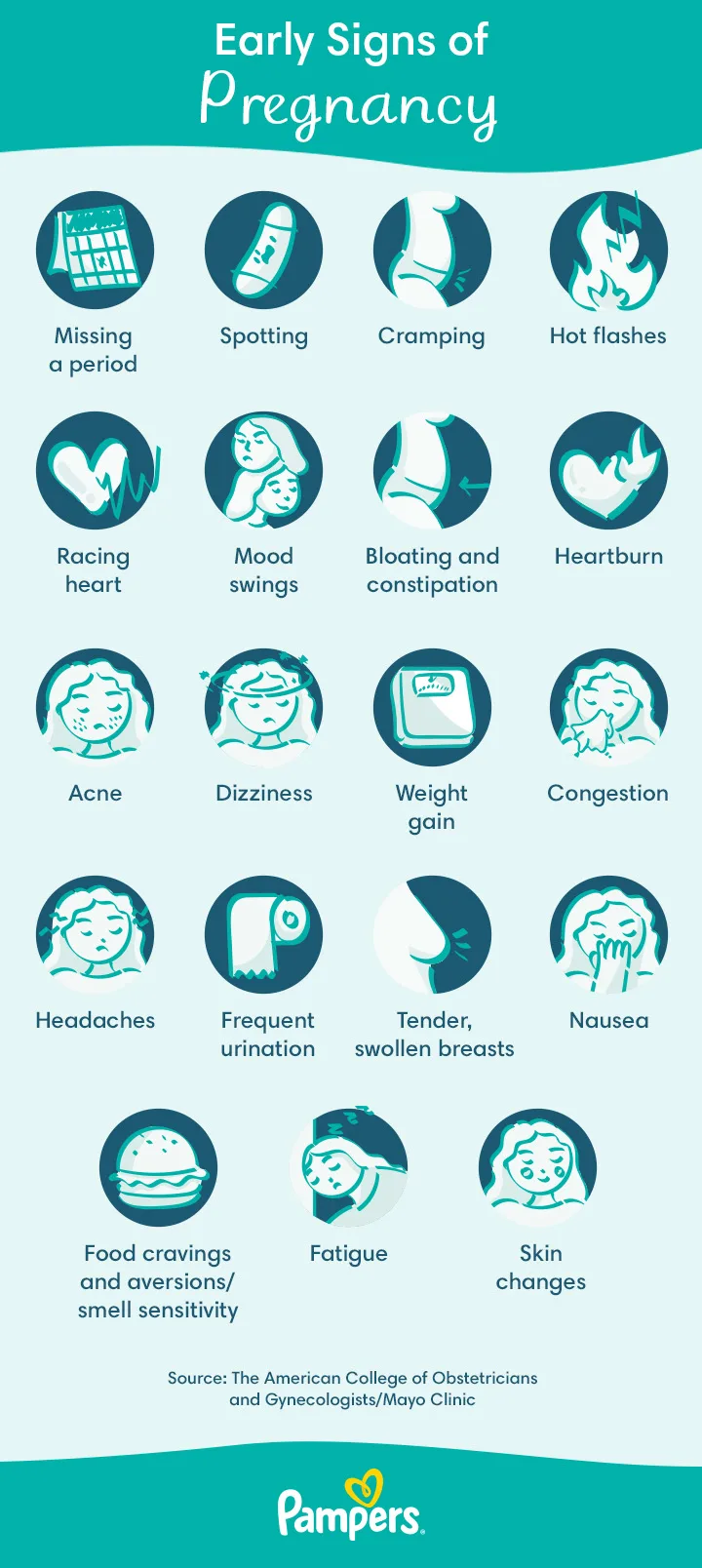19 Early Signs and Symptoms of Pregnancy
Sometimes it's hard to interpret the signals your body is sending you. If you suspect you might be experiencing the first signs of pregnancy, you're probably eager to know for sure. Here we list some of the early signs of pregnancy as well as symptoms you may experience throughout your pregnancy. Keep in mind that every pregnancy and every parent-to-be is different, so you may not notice every single sign and symptom listed.
First Signs of Pregnancy
Did you miss your period or maybe you have a gut feeling that you can’t shake. It's normal and understandable to ask yourself, “What are the early signs of pregnancy?” as you mentally cross off the different feelings you’ve been experiencing in the past few days.
You may start experiencing specific signs and symptoms of pregnancy early on even before you know for sure that you’re pregnant. Of course, either a home pregnancy test or a test through your healthcare provider will be the best way to determine if you’re pregnant.
In the meantime, read up on some of the early pregnancy signs and symptoms you may start feeling about one to two weeks after a missed period and within the first month of being pregnant:
Missing a period. One of the very early signs of pregnancy is a missed period, though if you have an irregular menstrual cycle, this sign can be misleading.
Spotting. Is spotting a sign of pregnancy? Yes, it can be! Very light spotting is an implantation symptom known as implantation bleeding and can be an early sign of pregnancy. It happens when the fertilised egg attaches itself to the lining of the uterus.
Cramping. Some parents-to-be experience mild uterine cramps during the first trimester, so cramping can be an early sign of pregnancy. To soothe your lower abdomen, place a hot water bottle, wrapped in a towel, on your belly or take a warm bath.
Hot flashes. Elevated pregnancy hormones and a metabolism that has sped up can both lead to a feeling of hot flashes resulting from an increase in your core body temperature. Your body compensates for this hot feeling by sweating more to help cool you down.
Racing heart. Hormonal changes can also cause heart palpitations, but if they last more than a few seconds, or if they happen frequently, contact your healthcare provider for a check-up to make sure everything is OK.
Mood swings. Finding out you’re pregnant is a big milestone, and it’s natural to feel everything from joy and excitement to anxiety and confusion. It may help to speak to your loved ones about your feelings.
Bloating and constipation. As the digestive system slows, you may also feel bloated (similar to what it can feel like at the start of your period) and constipated. But as an early pregnancy symptom, you could feel it even before you notice a missed period. Eat high-fibre foods, drink lots of water, and—if you can—add some exercise to your day. Though constipation is no fun, the bright side is that diarrhoea is rarely an early sign of pregnancy.
Heartburn. Is heartburn a sign of early pregnancy? It can be, as the muscles that keep digestive acids out of the oesophagus tend to relax with pregnancy, which can lead to acid reflux, commonly known as heartburn. Eat small, frequent meals, and avoid fried foods, citrus fruits, chocolate, and spicy or fried foods to help prevent heartburn.
Acne. The overproduction of sebum (oil) in the skin can cause pimple outbreaks during pregnancy.Gently cleanse your skin each day, use non-greasy cosmetics, and consult your healthcare provider about anti-acne medications that are safe.
Dizziness. Feeling a little dizzy can be a sign of early pregnancy. Low blood sugar levels, stress, and fatigue can make you feel dizzy or faint. To prevent dizziness in pregnancy, try to eat small, regular meals, and try to keep stress under control.
Weight gain. You might gain between 1 to 4 pounds in the first few months of pregnancy, but your doctor will be able to advise you on healthy pregnancy weight gain that is right for you.
Congestion. Early in pregnancy, the mucous membranes in your nose swell, dry out, and bleed easily. To help relieve congestion, consider using a humidifier, or try saline drops or a saline rinse, and remember to stay hydrated.
Headaches. Headaches can be an early sign of pregnancy as oestrogen levels rise. You may also experience tension headaches, which may be caused by stress or fatigue. Check with your healthcare provider about possible medications; for most pregnant women, acetaminophen is considered safe to treat the odd headache.
Frequent urination. If you find that you’re peeing a lot more than usual, it could be a sign of pregnancy as your kidneys are processing more fluid, which end up in your bladder. Don’t drink less water, though, as keeping hydrated is very important.
Tender, swollen breasts. Early on, your breasts may feel more tender and become larger, but as your body adjusts to the hormonal changes, the discomfort may decrease.
Nausea. With or without vomiting, nausea is a classic pregnancy symptom more commonly called morning sickness. So, how soon does morning sickness start? It often appears around a month after you become pregnant. For some, morning sickness occurs at other times of the day, not just in the morning, while others won’t experience it at all. Eat something before getting out of bed, like crackers, and then have small, regular meals throughout the day to keep your blood sugar levels stable.
Food cravings and aversions/smell sensitivity. Early signs of pregnancy also include changes in taste, smell, and cravings. Keep up a balanced diet and talk to your doctor if you crave non-food items (like chalk or dirt).
Fatigue. This is one of those not-so-fun early preggo symptoms. It’s natural to feel tired while pregnant, particularly early on when the hormone progesterone is in overdrive, making you feel fatigued. Your body is working hard to support your baby, so give yourself plenty of time to rest and relax.
Skin changes. You may notice skin pigmentation changes, such as the darkening of the skin around your nipples, dark patches on your face, or the appearance of a dark line from your navel to your pubic bone.
Does Everyone Experience Early Signs and Symptoms of Pregnancy?
Each person and each pregnancy is unique, so you may only notice some of these early signs of pregnancy. For example, the first signs and symptoms of pregnancy could occur before a missed period; alternatively, missing a period may be your first clue that you’re pregnant. What’s more, the symptoms you notice in a second pregnancy may be different from what you experienced the first time around.
When Do Pregnancy Symptoms Start?
Once again, it’s different for everyone. Some may experience very early signs of pregnancy in week 1 or week 2 after conception. Others may be pregnant and not experience or notice any symptoms for several weeks or even a month or two.
How Do You Know You’re Pregnant?
You may be asking yourself “How do I know if I’m pregnant?” If you think you may be pregnant, a home pregnancy test will confirm it. There’s no way to know that you are pregnant without taking a test.
If you’re experiencing any of the symptoms of pregnancy and take a home pregnancy test but the test comes out negative, there’s still a chance you may be pregnant. Wait until your period is a week late (or more), and then take the test again.
If the test comes out positive, make an appointment with your healthcare provider to confirm the pregnancy.
Once your pregnancy is confirmed, check out our go-to pregnancy guide, which includes lots of pertinent information and tools you'll need to navigate your pregnancy, including infographics, checklists, trackers, and more.
Other Signs and SymptomsYou May Experience During Pregnancy
Throughout your pregnancy, your body will do some unique and wonderful things. Some of these physical changes (like morning sickness) may subside, while others (like nasal congestion and heartburn) may continue over the course of your pregnancy.
These are some of the changes you may experience during the second and third trimesters of your pregnancy:
Discharge. A sticky, clear, or white vaginal discharge is a normal symptom during pregnancy but not necessarily an early sign. Discharge before your period vs discharge as an early sign of pregnancy might be difficult to decipher, so you might have to wait and see.Either way, contact your healthcare provider if it becomes strong smelling or is accompanied by a sore, itchy vagina.
Cramps or pain in the lower abdomen. In later pregnancy, you may experience a cramping sensation, which may be a result of round ligament pain or Braxton Hicks “practice” contractions.
Back pain. Backaches can be caused by hormonal changes, weight gain, and changes in your posture due to your growing belly. Practicing good posture, sleeping on your side, and getting some physical activity in each day may help relieve the pain.
Frequent urination. Although the more frequent urination that you may have experienced early in pregnancy probably subsides in the second trimester, by the third trimester, it may return. This is because your growing baby moves deeper into the pelvis, putting pressure on your bladder, so you may feel the urge to pee more often.
Itchy Skin. Wherever your skin stretches during pregnancy (for example, the abdomen and thighs), it could start to feel itchy. Avoid scratching, use a good moisturizer, and shower or bathe in lukewarm water, as hot water can dry out skin.
Stretch marks. As your skin stretches during pregnancy, you may notice stretch marks forming on areas like your belly, thighs, buttocks, and breasts. Gaining a healthy amount of weight slowly over the pregnancy may help minimise these streaks.
Shortness of breath. Your growing baby pushing against your lungs may cause that out-of-breath feeling, therefore, shortness of breath is not exactly an early sign of pregnancy. As your pregnancy progresses and your stomach grows, practicing good posture may give your lungs more room to expand.
Various aches and pains. You may encounter different symptoms at different points throughout pregnancy, such as dental pain or sensitivity, varicose veins or haemorrhoids, and swollen ankles or leg cramps. These pregnancy signscan cause trouble sleeping, even early on. Read more about some of these aches and pains.
Watch the following video to find out how your partner can be more involved during your pregnancy:
When to Consult Your Healthcare Provider
Most of the time, the aforementioned physical discomforts and changes are completely normal, but there are some warning signs you should not ignore, including severe headaches, changes in eyesight, or sudden swelling. If you notice anything that just doesn’t seem right, consult your healthcare provider.
FAQS AT A GLANCE
You might expect very early signs of pregnancy during week 1 or week 2, but most people only noticed common symptoms after conception. In fact, the most common first sign of pregnancy is a missed period. And since everyone is different, you may notice signs much earlier than others.
The Bottom Line
Early signs of pregnancy can be as subtle as a food craving or an aversion, or more noticeable like spotting or tender breasts. As your pregnancy progresses some of these signs and symptoms will likely return, such as heartburn, cramping, and frequent urination. If you’re unsure whether you’re pregnant but have been experiencing some of the early signs of pregnancy, take a home pregnancy test or visit your healthcare provider.
The signs and symptoms of pregnancy can be tiresome, especially if you’re experiencing several simultaneously, but sooner than you know it, you'll be giving birth and taking your baby home. This is just the beginning of an amazing journey!
See our Pregnancy Calendar for a more detailed description of everything that happens during each week, month, and trimester.
How We Wrote This article The information in this article is based on the expert advice found in trusted medical and government sources, such as the American Academy of Pediatrics and the American College of Obstetricians and Gynecologists. You can find a full list of sources used for this article below. The content on this page should not replace professional medical advice. Always consult medical professionals for full diagnosis and treatment.
Join Pampers Club and get:






